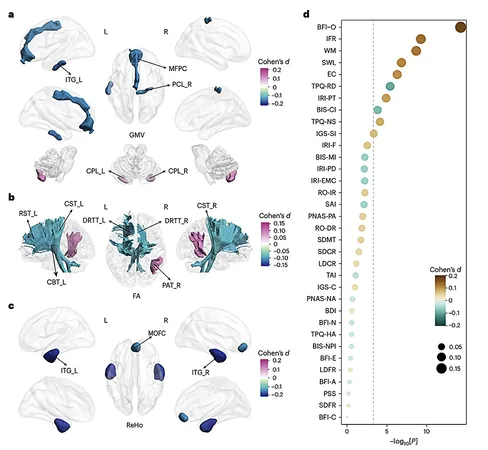
The Surprising Effects of Growing Up as an Only Child: A Deep Dive into Brain and Behavior
2025-04-21
Author: Olivia
Rising Trend of Only Children: What Does It Mean?
As family sizes dwindle in many countries, more parents are choosing, or sometimes finding themselves in a position, to raise just one child. This shift raises crucial questions about how growing up without siblings affects adult brains and behaviors.
Unraveling the Mixed Messages of Past Research
Previous studies on only children have yielded a patchwork of findings. Some suggest that being an only child can lead to exceptional academic performance and social skills, while others have warned of potential negative outcomes. The inconsistency across research has left us wanting a clearer understanding.
New Insights from Chinese Researchers
A groundbreaking study conducted by researchers at Tianjin Medical University and affiliated institutions aims to clarify the effects of being an only child. Their findings, recently published in 'Nature Human Behaviour,' delve into specific brain development patterns and behavioral traits prevalent in adults who grew up without siblings.
What Drives These Changes?
The researchers, Jie Tang, Jing Zhang, and their team, analyzed data from the extensive Chinese Imaging Genetics (CHIMGEN) study involving 2,397 individuals. By pairing only children with their siblings-having counterparts of similar backgrounds, they uncovered significant differences in brain structure and behavior.
Fascinating Discoveries: Brain Patterns and Behavioral Trends
What emerged from their analysis was nothing short of intriguing. Only children showcased specific brain traits, including enhanced language fiber integrity, reduced motor fiber integrity, larger cerebellar volume, and distinct cognitive profiles. Contrary to common stereotypes, many only children exhibited stronger neurocognitive abilities and positive mental health indicators.
The Role of Environment: A Key Factor
The study emphasizes that while growing up without siblings directly impacts brain and behavioral outcomes, the surrounding environment, including socioeconomic status and parental involvement, plays a significant role in modulating these effects. This insight paves the way for targeted interventions that could enhance the growth and development of only children.
A Call to Action: Enhancing Opportunities for Only Children
The findings suggest that broadening experiences and providing diverse stimuli can significantly benefit the cognitive and emotional health of only children. As this demographic continues to grow, understanding these dynamics becomes essential for fostering healthy development.









 Brasil (PT)
Brasil (PT)
 Canada (EN)
Canada (EN)
 Chile (ES)
Chile (ES)
 Česko (CS)
Česko (CS)
 대한민국 (KO)
대한민국 (KO)
 España (ES)
España (ES)
 France (FR)
France (FR)
 Hong Kong (EN)
Hong Kong (EN)
 Italia (IT)
Italia (IT)
 日本 (JA)
日本 (JA)
 Magyarország (HU)
Magyarország (HU)
 Norge (NO)
Norge (NO)
 Polska (PL)
Polska (PL)
 Schweiz (DE)
Schweiz (DE)
 Singapore (EN)
Singapore (EN)
 Sverige (SV)
Sverige (SV)
 Suomi (FI)
Suomi (FI)
 Türkiye (TR)
Türkiye (TR)
 الإمارات العربية المتحدة (AR)
الإمارات العربية المتحدة (AR)